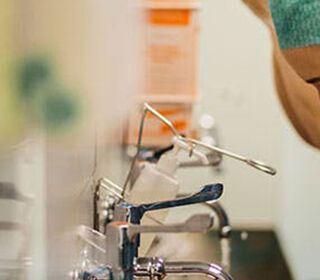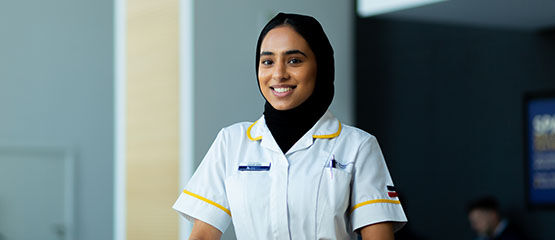
Blog

It will be no surprise to learn that our Allied Health Professional (AHP) students conduct placements throughout their course, where they will be expected to wear uniform. The uniforms are designed to comply with the health and safety requirements of the placement provider and importantly to identify you to colleagues and patients as a student and ambassador of Birmingham City University. It will ensure you meet the minimum levels of professional appearance required.
Uniform
At the start of you’ll receive up to three sets of uniform for the duration of your course, free of charge (this depends on the course you’re on). The nature of your uniform will depend on your course too.
Diagnostic Radiography and Radiotherapy students usually have tunics and trousers while paramedics have the typical green shirts and trousers, along with a hi-vis jacket, safety boots and a helmet. If you’re an Operating Department Practitioner you’ll get branded scrubs! You'll also be issued with a name badge with your full name to wear on placement and around campus (replacements are charged for).
If you want to buy additional uniform items they’re usually around £10 to £15 per item. We also know life happens so should you become pregnant during the course, maternity uniforms will be provided free of charge.
Top ten uniform tips
We have a whole policy that advises you what is expected in terms of other aspects of appearance from hair to shoes. Here are our top ten pointers:
- Visible tattoos are okay as long as they’re not profane or offensive, in which case you’ll have to use a tattoo cover product. Some NHS Trust partners have their own rules though so you’ll have to abide by those.
- Make-up is also fine as long as it’s modest rather than the kind you might use on a night out! Also, no false lashes.
- The only jewellery you can wear is one plain metal ring with no stones in and one small earring in each ear (the lower part of the lobe). If you have any other piercings, the jewellery must be removed (this includes tongue piercings).
- Clinical areas may allow you to wear a fob watch but wrist watches may be acceptable in non-clinical areas where they don’t compromise infection control.
- If your hair reaches your collar it will need to be tied/pinned up when on placement. And if you have facial hair that would be long enough to fall towards a patient, you’ll need to fasten that back too.
- If your socks are visible then they need to be plain.
- You don’t want to scratch any patients so make sure your nails are short enough to be safe and comply with infection control practices (this will be the focus of some skills sessions in the first semester so you’ll learn all about this). You must also not wear any kind of varnish or gel, or have nail extensions.
- A face veil is not permitted in clinical classes or on placement to ensure you are identifiable for patients and that patients can fully engage and communicate with you. A (Hijab) or turban may be worn provided it’s plain white, navy blue or black and that it’s well secured enough that you don’t need to keep adjusting it.
- Some of our placement partners have a ‘bare below the elbow’ policy when you’re caring for patients. If you are Sikh and wear a Kara, then you can still do this providing you push it up your arm and secure it above the elbow.
- Shoes. You could be on shift for 12 hours so they should be comfortable!
- Diagnostic Radiography and Radiotherapy students have to wear low-heeled with non-slip soles which are not made of fabric! Your shoes also need to cover the whole of your foot and be able to and decontaminated (we’ll leave that to your imagination!) This is so that they will keep you safe and comply with infection control standards.
- For Operating Department Practice students, these same guidelines for simulated clinical environments on campus but you'll be provided with one pair of clogs for your clinical placements.
- If you’re a Paramedic Science student you’ll need to wear black safety boots, which we will supply. These will be worn for simulation and placement activities, to protect your feet and ankles and which are resistant to oil, acid, and solvents as well as water. You are also allowed to wear green headwear, as this is the colour of the uniform you will be wearing.
Placements
Placements are a big part of your experience as a student studying to become an allied health professional. They're an important way to gain employability skills and build relationships - after all our placement partners are your potential employers!
Below is a video of some of our students discussing their placement experiences:
*This video was pre-Covid.

